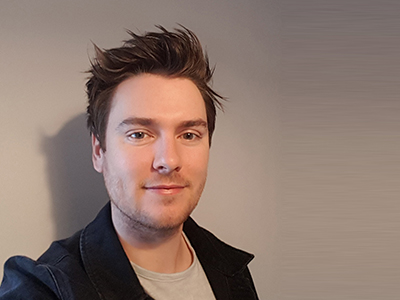Course overview
In games the role also continues to be vital to a successful production pipeline. There is a genuine demand for concept art graduates in this expanding marketplace.
This course has a strong focus on preparing you for working in the industry. The course has been designed by and is run by staff with significant industry experience who have an overwhelming knowledge of film, TV, game, animation and comic productions. We have many contacts in industry including at ILM, Atomhawk, Rare and Sumo Digital which ensures our teaching practises are reflective of current industry trends. We also invite concept arts guest speakers from studios, such as Ubisoft, Dreamworks and others, to not only engage with you, but to set you briefs reflecting the kind of work you would be expected to do in a professional environment.
You will have access to excellent facilities which include high-specification computers with graphics tablets and more specialised equipment such as Cintiqs, green screen facilities and motion capture, as well as drawing studios, scanners and light boxes for more traditional art development.
Ranked 20th in the world in the Animation Career Review International Animation School Rankings 2025. (Top 50 International Animation Colleges – formal degree. 207 colleges considered.) Find out more at tees.ac.uk/source.
Course details
Course structure
Core modules
Experiment with techniques and visuals to develop your individual strengths and style to create memorable characters.
Character design lets you demonstrate an understanding of the key issues relating to character development, including research, analysis and synthesis. From this you recognise and develop your original creative approach.
You also critically reflect upon your work to help further develop your specialist skills.
Assessment is through a portfolio of project work.
As a professional concept artist you might work in an animation or games studio or you might choose to run your own business as a freelancer. In this module you explore the different aspects of working in both of these roles. The emphasis is strongly on engagement with industry.
You primarily work on briefs supplied by professionals from animation and games studios. In the past these briefs have been supplied by Dreamworks, Ubisoft and Atomhawk.
During the module you have the opportunity to pitch your work to professionals and receive direct feedback.
We also have regular visiting lecturers from industry who give talks and provide feedback and advice on your work.
You are assessed on the portfolio of work created during the module.
Drawing skills are essential to being a successful concept artist, and this module provides you with the skills essential to supporting your artistic practice. Experimenting with materials and techniques allows you to become more confident in your work, allowing you to overcome any ‘artist’s block’ you may come up against throughout your career.
Developing your skills will encourage you to reflect and improve your artistic practice. It also helps you to develop your strengths and overcome your weaknesses to enable you to create original artwork.
Assessment is through a portfolio and an edited blog, with an emphasis upon process rather than product.
You have the opportunity to research and then construct an environment design within the field of concept art. The module will look at both interior and exterior environments. You will be expected to experiment with a broad range of techniques based around a given brief. Effective use of practise-based research will be encouraged and you are required to critically reflect upon the portfolio you create.
You have the opportunity to undertake a major, in-depth, individual study in an aspect of your concept art programme. These projects will be drawn from appropriate commercial, industrial, artistic or research-based problem areas. The project will involve research and investigation in relevant aspects of a very specific area of study followed by the production of a major deliverable portfolio of relevant practice based materials from the area of concept art. You will also produce a written report that contextualises and critically evaluates your final outputs.
Practice-based Research for the Visual Artist
You research and develop an area of professional practice relating to the your personal interests. This may be a new area of investigation or a development of an existing practice. You learn how to implement and critically evaluate practice-based research outputs synthesising your findings into your own practice.
Telling the story is what hooks your audience and we help you understand the key issues relating to visual storytelling.
You explore storytelling as it applies in various contexts such as storyboards, key moments, posters and comic strips.
The work you produce is informed by appropriate research and analysis of a range of visual storytelling contexts.
We help you demonstrate a high level of professional competence, willingness and confidence to experiment with a range of visual approaches. You critically reflect upon the work you produce.
Assessment is on your portfolio of project work.
Modules offered may vary.
How you learn
You learn about concepts and methods primarily through keynote lectures and tutorials using case studies and examples. Lectures include presentations from guest speakers from industry. Critical reflection is key to successful problem solving and essential to the creative process. You develop your own reflective practice at an advanced level, then test and assess your solutions against criteria that you develop in the light of your research.
Neurodiversity support
We understand that creativity and neurodiversity often go hand in hand, and we have wide experience in supporting students with a range of additional needs.
On the Concept Art team, our Disability Coordinator can meet you one-to-one to tailor support to your needs. You can also access help from your lecturers and tutors, the University’s Disability Service, the Student Journey Team, the Library team and other services.
You don’t need a formal diagnosis to get support – we know this can take time and that you may need help straight away. Support may include flexibility with learning and coursework, regular check-ins, specialist mentoring, or practical help with organising your workload and time.
If you have questions or concerns, you can email our Disability Coordinator at k.elling@tees.ac.uk.
How you are assessed
The programme assessment strategy has been designed to assess your subject specific knowledge, cognitive and intellectual skills and transferable skills applicable to the workplace. The strategy ensures that you are provided with formative assessment opportunities throughout the programme which support your summative assessments. There is a mix of practical work (usually in the form of a portfolio), poster and viva presentations, reflective blogs, and written reports. Formative feedback is typically given during lectures, tutorials and summative feedback using on-line methods. The assessments can include individual or group work. The assessment criteria, where appropriate, will include assessment of presentation skills and report writing.
Entry requirements
At least a UK 2.2 honours degree in concept art, games art or equivalent.
Other first degree subjects may be accepted when combined with a portfolio of creative work showing a range of fundamental drawing skills. The inclusion of character and environment design are essential while life drawing, observational drawing, perspective drawing and evidence of digital skills are important. 3D work is not a necessity.
Get some hints and tips on how to prepare a portfolio
In addition, international students will require IELTS 6.0 or equivalent.
For general information please see our overview of entry requirements
International applicants can find out what qualifications they need by visiting Your Country
Employability
Career opportunities
Many graduates have become professional freelancers, as well as working at a variety of studios including Creative Assembly, Splash Damage, Atomhawk and Paramount Pictures.
Information for international applicants
Qualifications
International applicants - find out what qualifications you need by selecting your country below.
Select your country:
Useful information
Visit our international pages for useful information for non-UK students and applicants.













 MA Concept Art
MA Concept Art MA Concept Art
MA Concept Art MA Concept Art for Games and Animation
MA Concept Art for Games and Animation